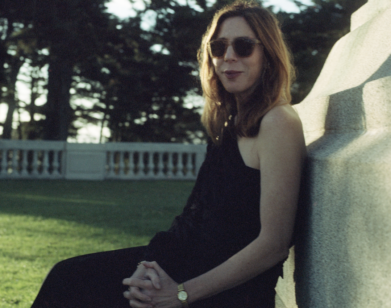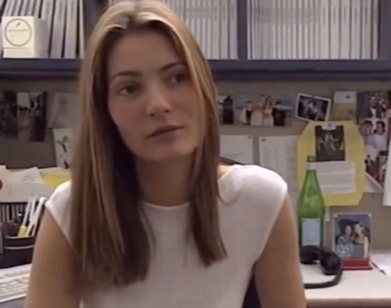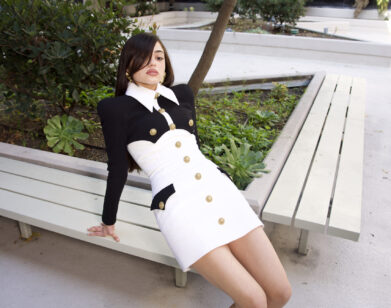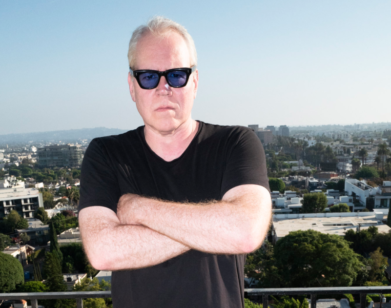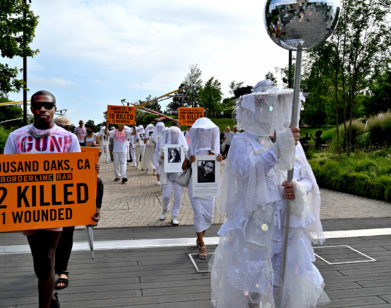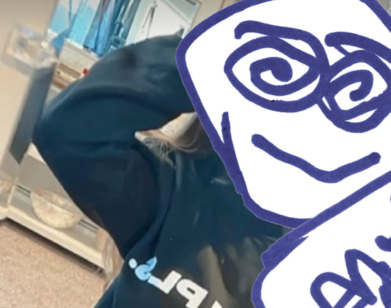IN CONVERSATION
Kevin Morby and Rachel Kushner on Life, Death, and Nipple Guards
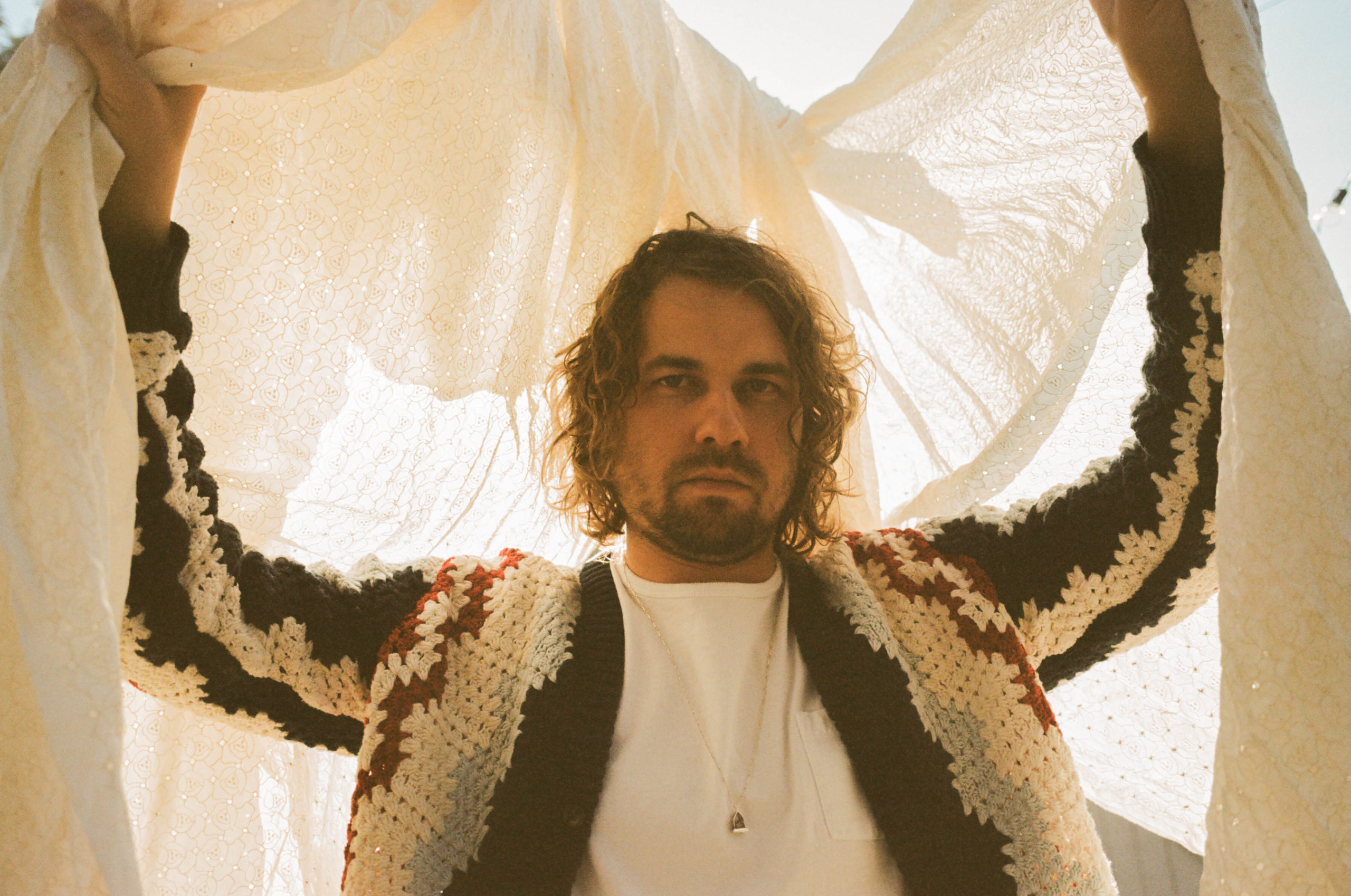
Photo courtesy of Chantal Anderson.
While singer-songwriter Kevin Morby was putting together his most recent album, This Is a Photograph (Dead Oceans), in Memphis’ famed Peabody Hotel, he let acclaimed Los Angeles-based, San Francisco-raised writer Rachel Kushner be his guide. This Is a Photograph, Morby’s seventh studio album, is a transcendental quest through the American South, tracking a throughline of historical tragedy and bittersweet nostalgia. Kushner’s sweeping work is similarly rooted in an innate sense of place, sometimes literally: She wrote the final chapter of her 2018 novel The Mars Room inside the trunk of a giant sequoia. From nearly 5,000 miles apart, Morby got a chance to chat with his source of narrative inspiration about life, death, and nipple guards. —CAITLIN LENT
–––
KEVIN MORBY: Hi, Rachel. Nice to meet you.
RACHEL KUSHNER: Hey, really nice to meet you too, Kevin. How are you?
MORBY: I’m good. Where are you?
KUSHNER: I’m in France, in a village called Collonges-la-Rouge, which I’ve been visiting for many years. Everything is built out of red limestone and it’s the only place like that. You’re driving along and everything is yellow limestone. And suddenly, it looks like a valentine rising up out of the forest. Everything is red.
MORBY: That sounds beautiful.
KUSHNER: It’s pretty cool. We usually stay with our friends, but we’re gonna be here for longer so we rented a house two doors down from them. This room that I’m in is from the 1500s.
MORBY: That’s amazing. My geography is so bad, but I’ve spent the most time in France out of anywhere in Europe because I’ve been blessed that the people from France are fans of my music. I usually hit the major cities when I go to Europe, but France is the one country where I’ll play all these towns I didn’t even know existed. But I don’t think I’ve ever been to Collonges-la-Rouge.
KUSHNER: That’s so neat to tour all around France.
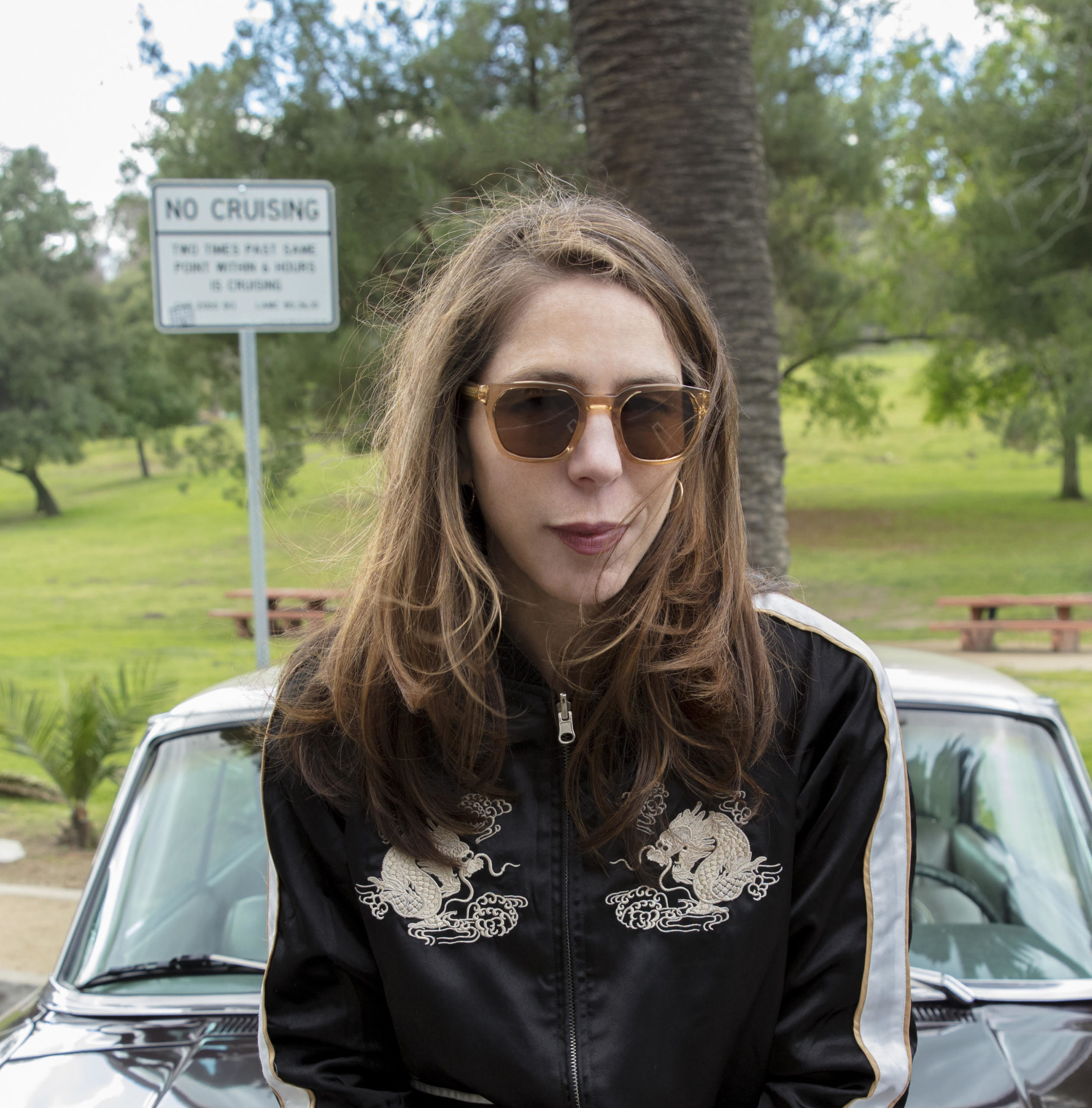
Photo courtesy of Chloe Aftel.
MORBY: It’s really neat. In 2020, right before lockdown, I did a three week tour almost solely through France and then had to come racing back home. So you’re vacationing for the summer?
KUSHNER: Yeah, sort of. I do some work while I’m here. I don’t really know what it means to take a pure vacation, and I’m sure you could relate. What I like to do is write, which I guess could also be called work. I don’t want to lose contact with it. When I’m here, I read a lot of novels. I consider reading part of my job or my role in the world. It’s how I interface, which is such an unsexy word, but it’s part of what I’m supposed to be doing.
MORBY: Oh, wow.
KUSHNER: I do some messing around, too. I have a son who’s 15. He wants to go swimming in the river and do cool stuff, so I do some more recreational things with him. He tried to go to the pool this afternoon, and they wouldn’t let him in because he wasn’t wearing a Speedo.
MORBY: That’s so European. They spot the American with the baggy shorts from a mile away. And they’re like, “You gotta be one of us if you’re gonna swim in this pool.”
KUSHNER: I told them he could borrow my bikini, but he wasn’t really into that. So where are you? There’s this beautiful orange wall behind you.
MORBY: Thank you. This is my house. I’m lucky to have two homes. I’m in Kansas City. I have this little bungalow house that’s just for my music. It’s like my studio. Like you were saying, I don’t think I’ve ever taken a pure vacation. There’s always some undercurrent of, “I’m gonna bring a guitar and see if the creative spirit comes knocking on the door.”
KUSHNER: What do you have in there, do you have a piano?
MORBY: I have a piano. I have a Mellotron, I have maybe 15 guitars. I have a banjo. I got it because I’m making a music video next week. I’m going to be playing the banjo in the video, so I need to at least somewhat look like I know what I’m doing. Every new instrument is a vessel into writing something new.
KUSHNER: I’m sorry if this seems cliché, but listening to your records, especially Oh My God, it seems to accentuate your vocals so much, and you have a really beautiful voice. I was wondering, when did you know that you could sing?
MORBY: I don’t know if anyone’s ever described my voice as beautiful before, but that’s a huge compliment. Growing up, it was really about my obsession with Leonard Cohen and Bob Dylan and Lou Reed, three men who I always felt, like myself, were working with what they had. I never felt like I had great range or great pitch or anything like that. But it’s something that you come into as your own. I don’t know if you’re a fan of the band Silver Jews, or David Berman, but he’s got that amazing line, “All my favorite singers couldn’t sing,” and it always goes back to that. But my girlfriend, Katie [Crutchfield], has a band called Waxahatchee. She has an amazing voice with this crazy range. I never considered myself a singer, but more of a songwriter. And that’s how I was able to get it out. Just using the voice that I had. But thank you very much for saying that.
KUSHNER: You’re welcome. You have a really pretty voice. It’s significantly prettier than Bob Dylan’s or Lou Reed’s or Leonard Cohen’s. And yes, David Berman. I wasn’t a Silver Jews fanatic. In fact, I came to awareness of him through his book of poetry, Actual Air.
MORBY: I knew him by proxy because some of my best friends helped him produce his last record Purple Mountains, which sort of ended up being his suicide note. Some of them were with him on the morning of his death. But I never met him. I was going to play a show with him on that tour and I was really looking forward to it, because it was going to be like meeting one of my heroes. Speaking of Oh My God. I have my shirt off on that album cover. When I shot that album cover, I was the most out of shape I’d ever been in my life, but I didn’t want it to be dated. I didn’t want to wear an item of clothing that someone could say, “Oh, those were in fashion then.” It added this biblical undertone to the record. I remember the day the record got announced, I was like, “Oh my god, what have I done?” But it’s all worth it because my friends who were on Purple Mountains with David, told me this story one day. David was really into all these very niche things, one of them being nipple guards for chafing. He would wear these nipple guards that runners wear.
KUSHNER: I didn’t even know those existed until right now.
MORBY: I didn’t know that they existed either. He wasn’t a runner, but he was into these things. And so one day he pulled his shirt up and he had these nipple guards on and they were like, “What is that?” And he was explaining to them, “It keeps your nipples from chafing.” And then he paused and was like, I feel like he said it to me, “Morby went tits out on his album cover, huh?” And they were like, “Yeah.” And then he goes “Bold.” And if for nothing else, I’m glad I did the album cover to know that David Berman said that.
KUSHNER: That’s a wonderful acknowledgement, because I’ve seen that album cover. Not only are you not wearing a shirt, but you look, raw is the wrong word, but without defenses, like somebody who just woke up in the morning and is intimately gazing at another person. But it’s the person who’s holding the record cover who’s getting that treatment. It’s very exposed. So for him to look at it and acknowledge you and see something in it, it’s as if you met. I like a whiff of somebody else’s vulnerability. That’s a form of communicating, right?
MORBY: Absolutely. And like I was saying, [Berman] was such a vulnerable poet and author, and he’s obviously such a sensitive person. And a lot of that led to his death. And that album cover, I had photos of my heroes in their beds across from that bed that I took that photo in. There’s a photo of Nina Simone in her bed. Because I write a lot in bed, in the morning or right before going to bed. It’s the best desk in the world. Do you ever write from bed?
KUSHNER: I really don’t because I have an office in my house that’s next to my bedroom and the computer that I work on is a desktop that’s 20 years old.
MORBY: Oh, wow.
KUSHNER: It’s not connected to the internet.
MORBY: I love that. I write a lot from bed and I have to be sprawled out in a weird position, like a child, to get comfortable enough. But I’ve read a lot about Nick Cave. I don’t know if you’re a fan of Nick Cave’s, but he puts on a full suit every day and walks into his office.
KUSHNER: His presentation is much more theatrical. I don’t have a presentation like that. I’m a writer, so I’m intrinsically a very interior and private person. He’s a lifelong performer. But his style had some effect on me. I couldn’t say what it is, but when I was younger, I worked in a lot of live music clubs in San Francisco, and Nick Cave came and played at the Fillmore. I saw your tour schedule, you’re going to play at the Fillmore. It would be really cool to see a live show of yours.
MORBY: I would love for you to come.
KUSHNER: I really want to, and I want to bring my son, who is almost 15. He’s a musician. He plays a lot of instruments, and he builds tube amplifiers.
MORBY: Wow!
KUSHNER: I really want him to see your show and maybe meet you.
MORBY: Absolutely. Anytime you want to come!
KUSHNER: So when I was working at the Fillmore and Nick Cave came to play, he came out to a Barry White song wearing a gray sharkskin suit and white shoes. You could see that he’s living in this very aestheticized world. A friend of mine went to a Barry White concert once and said that they had orderlies rolling oxygen tanks up and down the aisles to revive women who were fainting from his sex appeal. And I could see that Nick Cave was tapping into all this.
MORBY: Speaking of San Francisco, I am such a huge fan of your work. On my last record, This Is A Photograph, I was reading you throughout the process. You soundtracked me making this record. Obviously there was no sound, but it sounds appropriate to say you soundtracked it. I felt like I was in this world of Kushner while I was living out of the Peabody Hotel and working on the album. I know that cover looks nothing like the cover of The Hard Crowd, but that was a major reference point that I kept showing to photographers. I wanted to display the toughness and the effortlessly cool energy in that photo. Even though most of your work takes place in the Bay Area, or New York, or Italy, I had in my notes for weeks leading up to this interview to ask about your relationship to the South, or if you’d ever write about it. And then my publicist sent me the story that you wrote a few days ago. I couldn’t believe it. It felt like I was in The Truman Show. Like, “No way she wrote this story about a songwriter in the South!” Do you have any relationship to the South? And I’m only asking this because when I was there, I felt it could be the backdrop to a Rachel Kushner story. Have you spent any time in Memphis?
KUSHNER: I love all those questions and I’m honored that I would be any kind of reference while you were writing. I’ve only spent a little time in Memphis. So that car on the cover of my essay book, The Hard Crowd, I still have that car. It has a much better paint job now than it did in that photo. I took some prize money and I put it all into a clear coat and many layers of lacquer. It was my first car that I ever bought, in 1992. 30 years ago. You seem like you’ve basically been an artist forever, making music forever. I was not like that. I was living in a bohemian la la land. I was driving around with a friend in that car, my ‘64 Ford Galaxy. We did this whole Southern odyssey, and we passed through Memphis. This was 1994, and we did not stay at the Peabody Hotel‚ we had no money. We stayed at this place called the Admiral Benbow.
MORBY: Like in the story!
KUSHNER: He tries to go there and it’s closed. I looked it up on Yelp. It has only one star reviews. People were like, “This is a hooker motel from hell, fuck, this place!” It closed down several years ago, but my friend and I stayed there and there was this adorable girl at the front desk. And every time she answered the phone, it sounded like she said, “Admiral Bimbo” and we kept calling it the Admiral Bimbo. We were tourists, so the first thing we did was go to Graceland. My relationship to the South is based originally on the fact that my mother is from Chattanooga, Tennessee. And I know that part of the world and Appalachia generally a little bit better because I lived for a little while in Asheville, North Carolina, on the other side of the Great Smoky Mountains. So I guess writing that songwriter was like LARPing that I know about the South.
MORBY: There’s a few other things I really wanted to ask you about. One of the things is The Mars Room. It’s the first thing that I read by you. The last line gut-punched me in such a way. It is so profound that it can even exist outside of the time and place of that story. So when it comes to that last line, how does that work for you?
KUSHNER: Thanks for asking that. Thanks for reading the book. Gosh, it’s magic, Kevin! When you’re writing and you’re building up real psychic momentum—and I’m sure you feel that as a songwriter—you sit down and you know what to write and you know the cadence and the types of words to choose. Creative work that isn’t good, whether mine or anyone else’s, has an arbitrary flavor to it, where they could have chosen this image, but they could have put that one. But when you’re really in the zone, it’s not arbitrary. When I get lucky, that’s how I feel about it. In terms of that whole last scene of the character when she is in that forest, I know the geography of the place where she goes very well. No one has escaped from one of these Level Four facilities in California. So you write yourself into a corner with a character in prison. My friends would be like, “You’re writing a book about a person with a life sentence. So what, she’s just there? How do you build narrative out of that?” But then you have to remind people, the world of prison inside is as vast and intricate a human world as the world outside because it’s made of people. People talk, and they have spirit and character, which cannot be taken away from them. A friend of mine lives in those foothills there. Behind the house, there is a hill where there are secret Sequoia trees that are a thousand years old. No one knows about these trees. Most of the Sequoias are on a drive and there’s a plaque and there’s a lot of tourists taking pictures. These are secret trees, and you have to learn how to see them because they are so big in diameter that the eye does not expect it. They hide in plain sight. And then you look upon this field and you realize, “Oh, the trees are 30 meters wide.” Or maybe I’m exaggerating. I do that for a living.
MORBY: So do I.
KUSHNER: You gotta go big to tell the truth sometimes.
MORBY: I totally agree. I’m a huge proponent of that.
KUSHNER: So I went back there, and she comes back there too. And I sat inside one of those trees. They’re all hollow inside because they’ve lived so many lives. They’ve been struck by lightning over and over again. The tree can remain healthy even if the whole inside of it is burned out. So I sat in one of those trees and wrote the whole last chapter.
MORBY: Oh my god, this is amazing. You wrote the last line in one of these trees. Not to be cheesy, but that last line is as ancient as one of these trees.
KUSHNER: I wanted her to be able to conceive of her life, as not delimited by what the state told her it was. That you could see that she’s part of something much larger. I really think that’s real. If you look up at the heavens at night, it makes human life seem relatively small. That’s what I started with when I wrote that last chapter. I’m really interested in the epic, and from listening to your music, I believe that you are, too. It’s a responsibility to lasso the epic. The epic has to do with everyone living and dead. It’s so cheesy to quote myself, but that new short story that I wrote about that songwriter, he says, “This landscape is more dead than living. Isn’t that the case everywhere?”
MORBY: I love that line.
KUSHNER: You get to a certain age where a lot of people that you’ve known are not around anymore. Yet they’ve shaped me and I’m still in conversations with them. It’s a confounding mystery that people depart Earth never to be seen again. I still don’t understand it, so I had to write about it. And then when I started writing about it, I became a person who writes about stuff like this. I was a bartender in the Tenderloin in San Francisco for a long time. I met a lot of trippy people and had experiences where it’s one hour of your life, but it shapes you forever. You never see that person again, but it’s about honoring your life and theirs, and also this moment that you have together.
MORBY: You hit on that in the last line of The Hard Crowd. I love that you’re self aware in this way of like, “Maybe this is boring to you. So start your own litany, go tell your own boring story.” I would love to have you and the family out to any of my shows that are coming up. We’re playing in Los Angeles and San Francisco. You guys come back stage, hang out. Thank you so much for doing this. Do you mind if I take a photo of the screen with my Pentax?
KUSHNER: No, not at all. Get the chandeliers because I’m in a castle.

